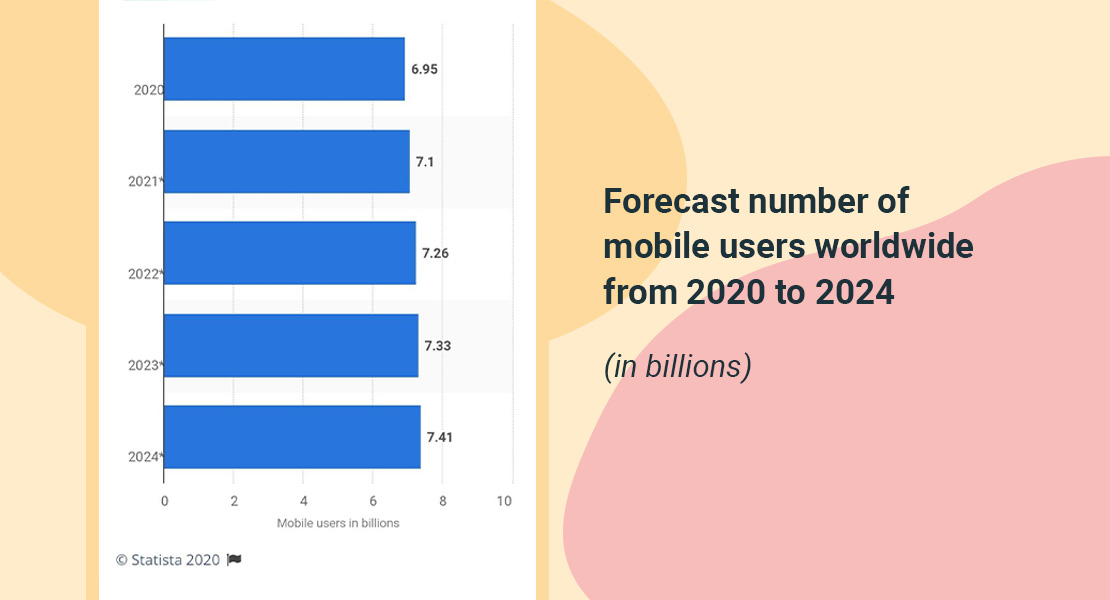How AI Can Help Mobile Applications Drive a Competitive Edge
Artificial Intelligence (AI) has become nowadays a driving force of progress. It gives businesses the chance to meet extremely high demands established by the market. AI technology never stops improving thus allowing us to try out new experiences, to increase working performance, and to simplify everyday life activities.
Ten years ago, mobile phones were used only for calling and sending messages. Nowadays they encompass almost every sphere of our life. According to Statista, the number of mobile users is increasing and is expected to reach 7.41 billion people by 2024. It means that businesses have to embrace digital transformation and go mobile to engage more consumers and keep growing. While the competition on the market is fierce, mobile software companies have to create new ways to retain consumers with more personalized experience. That is when AI becomes absolutely necessary to support sustainable business development.

Artificial Intelligence At A Glance
In general, AI is a huge sphere that includes a great number of sub-branches like Machine Learning (ML), Computer Vision (CV), and Natural Language Processing (NLP). ML aims to give computers the ability to study without being programmed. The main goal of it is to find a way to develop teaching programs that will let computers study on their own. Snapchat Filters that allow people to use face filters may serve as a good example of Machine Learning for mobile apps. People don’t have any problems distinguishing faces, however, it is not that easy for computers. Snapchat uses ML algorithms to scan millions of faces to learn to differentiate them.
Computer Vision is a branch that seeks to find a way for computers to “see”, to understand the visual information presented in photos and videos. Although human vision is known for its complexity and is superior to computer vision, a few steps have already been taken to achieve better results. Some time ago it was trendy to try on filters in social media that could make you look like the opposite sex or look older. The technology that has made it real is Computer Vision.
NLP is another important field that lets computers understand and interpret human language both spoken and written. Nowadays we take for granted such things as predictive text, search options that Google offers us and even smart assistants like Siri from Apple and Alexa from Amazon. However, for the previous generation of technologies, those were only bold ideas.
Chatbots and Virtual Assistants

Nowadays mobile software development companies are trying to make use of chatbots and virtual assistants to build a better connection with customers. According to the statistics published by Forbes, in 2019 there were twice more people than in 2018 who wanted to use chatbots because they considered them helpful. It was estimated that around 67% of consumers around the world have been using chatbots for support issues.
There are 3 most famous voice-controlled assistants to be mentioned: Alexa by Amazon which is leading the competition, Google Assistant, and Siri by Apple. All of them are more than just technologies giving mobile devices a fancy ability to respond to questions and perform some actions such as Internet search or weather check – in fact, they serve as a communication bridge between users and their gadgets. According to a report by Microsoft, 72% of survey participants have been using a virtual assistant. Moreover, over half of them have been using it on their mobile phones. So mobile app development virtual assistants are a crucial technology.
How Will Mobile AI Impact Businesses?
AI has already proven its significant impact on the mobile industry with the appearance of face and voice recognition, smart search, however, it has much more to show in the future as Machine Learning and other branches of AI keep evolving. IDC has published research showing that by 2022 companies that use AI will be able to respond to their clients’ needs ⅓ faster than their competitors.
Adding AI-based functions to mobile applications will help businesses to win more clients as they make the apps more interactive and efficient. Here are some benefits that AI integration brings into the mobile app industry.

First of all, AI provides better security. Today, when the digital world is growing, the risk of cyber attacks and frauds is also increasing. AI offers a variety of ways to protect data, such as multi-factor authentication and biometric logins through fingertips and palm scanning.
Secondly, AI opens new doors for more personalized mobile app experience since ML algorithms allow applications to analyze users’ behavior and prove personalized recommendations to them, thus ensuring better customer satisfaction.
What is more, AI-powered applications provide better consumer engagement without any quality losses. As an example, instead of typing it is possible to use voice commands that allow users to save time on typing queries.
Another useful feature offered by AI is a new level of analytics. ML tools make it possible to track user behavior and some of mobile app performance metrics such as availability, errors, response time, average speed, and others.
All of these features and many others widen the horizons of mobile app development, increase the connection with the users, and increase customer satisfaction.
Conclusion
Artificial Intelligence has become a trend in mobile app development. It offers more opportunities, advanced customer engagement, and higher efficiency. AI technologies open the ways for businesses to personalize their applications, make them more user-friendly, and, therefore, attract more consumers. AI development has come into modern business for long, and probably, forever. Thus mobile software development companies which bet on Artificial Intelligence are to achieve and keep the leading position on the market.












